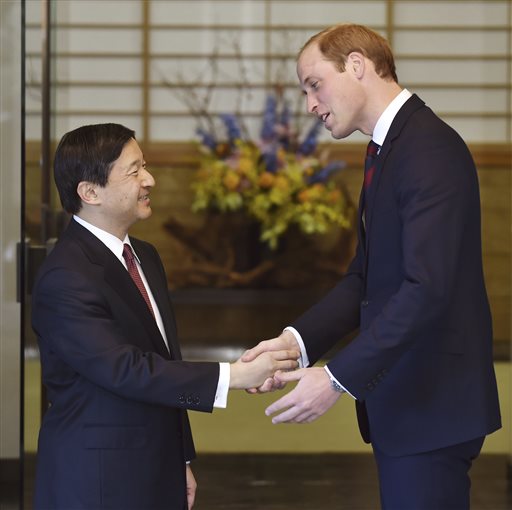
Britain’s Prince William, right, is greeted by Japanese Crown Prince Naruhito upon his arrival at the Akasaka Palace in Tokyo Friday. William is on his second day of his four-day trip to Japan. AP Photo
TOKYO — Britain’s Prince William, on his second day of a four-day trip to Japan, had tea Friday with Crown Prince Naruhito. Both princes may be equally charming, but it is no contest which one is seen as more approachable.
Members of the Japanese imperial family lead a highly cloistered life, guarded by the moat-surrounded stone walls of the palace. Their media coverage is just as tightly orchestrated and controlled.
And that has created a respectful distance between the family and the general public.
Don’t count on regular Japanese clamoring to get the same dress or jewelry spotted on Naruhito’s wife Masako, the same way many around the world do for Kate’s.
Comments from the family are few and far between — in a poem issued here, a speech while waving behind bullet-proof glass on a balcony there.
Crowds have appeared for William, 32, waving to him, snapping cell-phone photos and eager to shake his hand.
“Compared to Japanese royalty, he is so friendly,” said Naoyuki Tajima, who is overseeing an exhibit about British technology and culture in Tokyo, where William is scheduled to visit.
Tabloid-type gossip rampant for the British royals is taboo for their counterparts in Japan. Part of it is caused by the general docility of the mainstream media here. But much of it is the prevalent social sentiments about seeing the Imperial Household as shrouded in secrecy.
Until Japan’s defeat at the end of World War II in 1945, the emperor was seen as divine. No one believes that today, but that hasn’t changed the deeply rooted view they aren’t really regular folks.
Ingrid Seward, editor in chief for Majesty Magazine, a London-based monthly that covers European royalty, said the Japanese Emperor and his family could become more of a plus for the country’s image by “modernizing” and becoming more visible.
William wins praise for his views on the environment and symbolizes “hope for the monarchy of the future,” she said.
“They should take a look at Prince William and how he responds to the people he meets and how he is able to talk to the crowd, like his mother did before him,” she said, referring to Diana.
On Friday, William laid a wreath at a cemetery in Yokohama, near Tokyo, where British, Australian, Indian and other Commonwealth servicemen are buried who died in Japan as prisoners of war or with the occupying forces after the war. His mother visited the same cemetery when she visited Japan.
In a speech at a Tokyo shopping center, he apologized for how Kate and their son George had not been able to come this time, but promised she would come next time.
“In just 24 hours so far in Japan, I have had a chance to experience the blend of ancient and modern which so characterizes this amazing country,” he said.
William is scheduled to visit northeastern Japan, devastated by the 2011 tsunami and earthquake, which left tens of thousands of people homeless and killed nearly 19,000 people.
Robert Dujarric, a professor at the Institute of Contemporary Asian Studies of Temple University in Tokyo, believes the princes’ differing status stems from the contrasting historical backgrounds, as well as the more powerful and independent political role the British monarchy plays today, compared to Japan’s.
“Over recent decades, many members of the House of Windsor, though not the Queen herself, have received the same treatment as actors, soap opera personalities,” he said.
The interaction among William and the popular Kate with the public contrasts sharply with Japanese royal family, whose activities are governed by the Imperial Household Agency. But the agency has been criticized for isolating them from the public and for imposing traditions that some see as outdated.
The Harvard- and Oxford-educated Masako — only the second commoner to wed into the imperial family after her mother-in-law Empress Michiko — used to be a fashionable career diplomat.
As soon as she married in 1993, she fell out of touch with trendy looks, and has also been largely kept out of public view.
Masako, 51, has suffered bouts of depression for the last decade, a sickness the Imperial Household Agency acknowledges is stress-related, and the public speculates is the sign of the toll her insular and rigid life has taken.
She has appeared more energized when traveling overseas or with guests from abroad. She made it to the tea with William.
No wonder William is, for Japanese, a prince closer to the people than their own.
“He is cool and handsome. And very tall,” exclaimed Akane Ebihara, an employee of the Tokyo Fire Department, after shaking hands with William as he passed by with his entourage.
Asked by a reporter about his receding hairline, she vehemently denied that was a drawback.
“Oh, no. No problem,” she said. “His smile is good. His hand was very warm.”
___